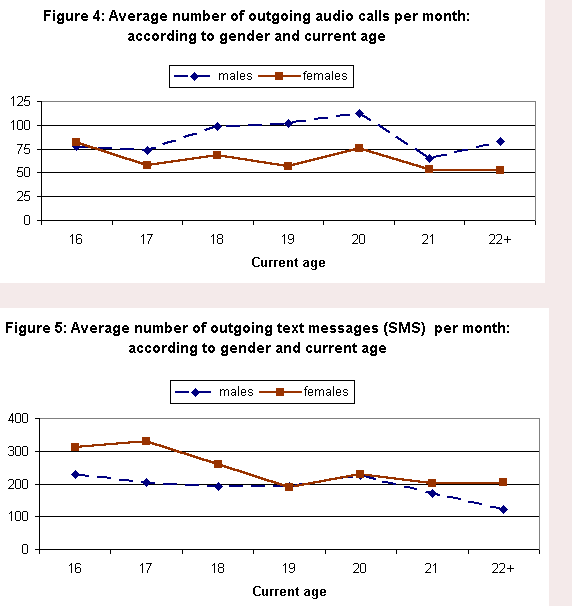December 29, 2006
The silence of the men
The pseudo-scientific urban legends about sex differences in talkativeness are mutating slightly as they spread around the world. The most recent variants can be found in a 12/22/2006 article in Die Welt: Von Heike Stüvel, "Das Schweigen der Männer" ("The Silence of Men"):
Amerikanische Forscher haben herausgefunden: Männer sprechen im Durchschnitt ein Sechstel weniger als Frauen. Die einzige Ausnahme sind Telefonate mit dem Handy.
Frauen sprechen im Schnitt 30.000 Wörter am Tag, Männer 25 000. Nur ein Viertel redet über Sorgen und Probleme. Am Telefon werden Männer redseliger. Sie benutzen ihr Handy häufiger als Frauen und führen damit im Schnitt 88 Telefonate die Woche.
American researchers have discovered: Men speak on average a sixth less than women. The only exceptions are mobile telephone calls.
Women speak on average 30,000 words a day, men 25,000. Only a quarter [of men] disucss their concerns and problems. On the telephone, men become more talkative. They use their mobile phones more than women and make on average 88 calls a week.
The 30,000/25,000 is a pair of numbers that I haven't seen yet -- there are dozens of pairs (and ranges) of numbers out there among the replications of this meme, among them 20,000/7,000; 30,000/15,000; 7,000/2,000; 30,000/12,000; 50,000/25,000; 25,000/12,000. But I haven't seen 30,000/25,000 before.
Who are the "Amerikanische Forscher" I wonder, and where do the words-per-day and the cell phone counts come from, I wonder? This Swiss study supports the view that college-age males, at least, might make more cell phone calls:

The Die Welt article might not tell us where its words-per-day and cell-phone usage numbers come from, but a few paragraphs in, some familar names show up:
Männer und Frauen sind - was das Kommunizieren betrifft - komplett verschieden. Obwohl Frau und Mann häufig dieselben Worte verwenden, meinen Sie selten das Gleiche. Woher kommt das?
Die US-Neurologin Louann Brizendine fand heraus: Das weibliche Gehirn hat im Sprachzentrum elf Prozent mehr Nervenzellen als das männliche - besonders im Bereich, der für Gefühle und Erinnerungen zuständig ist. Warum Männer oft nicht zuhören, haben Forscher auch herausgefunden: "Frauenstimmen sind aufgrund der Stimmbänder und des Kehlkopfs komplexer und melodiöser als Männerstimmen", so Michael Hunter von der Universität Sheffield. [...]
Das Gehirn wird durch die verschiedenen Schallwellen stärker beansprucht - das fordert viel Konzentration und führt bei Männern zur Ermüdung.
Where communication is concerned, men and women are completely different. Although women and men often use the same words, they seldom mean the same thing. Why is that?
The American neurologist Louann Brizendine has discovered: The female brain has 11% more nerve cells in the language center than the male does -- especially in the area that is responsible for feelings and memories. Researchers have also discovered why men often do not hear: "Because of the vocal cords and the larynx, women's voices are more complex and more melodious than men's voices", says Michael Hunter of the University of Sheffield.
The brain is more strongly stressed by varying sound waves -- this demands concentration and makes men tired.
Right. The "11% more nerve cells" part is bogus, though again I'm not sure exactly where it comes from. For a discussion of some of the parts of Louann Brizendine's book about the language-related areas of the brain, see here and here. (Dr. Brizendine hasn't done any research of her own on this topic.) None of Michael Hunter's research, as far as I'm aware, establishes anything about degrees of concentration or men getting tired or (in fact) anything about differences in men's perception vs. women's perception. For a discussion of Michael Hunter's work on (men's) perception of different sorts of voices, see here and here.
The Die Welt article ends with familiar stuff about how women express feelings, and men express facts, and that's all because of the paleolithic division of labor, in which men were responsible for hunting bison and "Frauen waren eher für Kinder, Küche, Kirche... oops I mean Hege, Pflege und Gefühle" ("women were instead for nurturing, care and feelings").
I think of Die Welt as a serious, reponsible publication. Wikipedia calls it "the flagship publication, within the so-called quality newspaper market, of the Axel Springer empire". It's disconcerting to see such a paper spreading apparently fabricated numbers without any serious attempt at attribution or any fact-checking at all.
There's a lot of hand-wringing these days about the sinking fortunes of print media. It's usual to blame competition from new sources of information. But I wonder how much of the problem is epitomized in articles like this one. Maybe the public has more sense than the journalists do.
Posted by Mark Liberman at December 29, 2006 03:06 PM